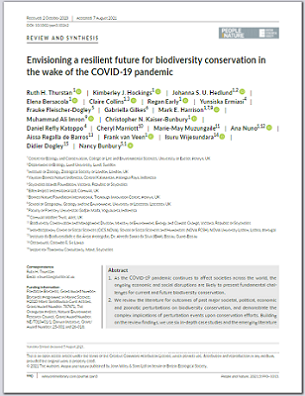
As the COVID-19 pandemic continues to affect societies across the world, the ongoing economic and social disruptions are likely to present fundamental challenges for current and future biodiversity conservation. We review the literature for outcomes of past major societal, political, economic and zoonotic perturbations on biodiversity conservation, and demonstrate the complex implications of perturbation events upon conservation efforts. Building on the review findings, we use six in-depth case studies and the emerging literature to identify positive and negative outcomes of the COVID-19 pandemic, known and anticipated, for biodiversity conservation efforts around the world. A number of similarities exist between the current pandemic and past perturbations, with experiences highlighting that the pandemic-induced declines in conservation revenue and capacity, livelihood and trade disruptions are likely to have long-lasting and negative implications for biodiversity and conservation efforts. Yet, the COVID-19 pandemic also brought about a global pause in human movement that is unique in recent history, and may yet foster long-lasting behavioural and societal changes, presenting opportunities to strengthen and advance conservation efforts in the wake of the pandemic. Enhanced collaborations and partnerships at the local level, cross-sectoral engagement, local investment and leadership will all enhance the resilience of conservation efforts in the face of future perturbations. Other actions aimed at enhancing resilience will require fundamental institutional change and extensive government and public engagement and support if they are to be realised. The pandemic has highlighted the inherent vulnerabilities in the social and economic models upon which many conservation efforts are based. In so doing, it presents an opportunity to reconsider the status quo for conservation, and promotes behaviours and actions that are resilient to future perturbation.














